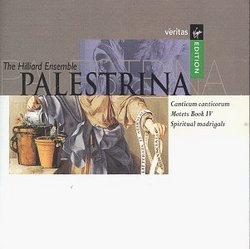| All Artists: Palestrina, Hillard Ensemble Title: Motets & Madrigals Members Wishing: 0 Total Copies: 0 Label: Virgin Records Us Release Date: 9/19/1995 Genre: Classical Style: Opera & Classical Vocal Number of Discs: 2 SwapaCD Credits: 2 UPC: 724356116825 |
Search - Palestrina, Hillard Ensemble :: Motets & Madrigals
 | Palestrina, Hillard Ensemble Motets & Madrigals Genre: Classical
|
Larger Image |
CD Details |
CD ReviewsThree Surprises Leslie Richford | Selsingen, Lower Saxony | 01/17/2005 (5 out of 5 stars) "There are three surprises on these two CDs, recorded in November 1984 in London. The first is the recording location: the Hilliards have something of a penchant for historical churches and abbeys, but on this occasion they chose the No. 1 Abbey Road studio, a decision which, in my humble opinion, had a positive influence on the sound of the recording: here there is no echoing and none of the background noise that was a characteristic of some of their earlier recordings. The blend of the five voices is wonderfully captured, not, indeed, particularly spaciously, but clearly and with sound engineering finesse, as one would expect from Britain?s most prestigious recording studio. The second surprise is the fact that the Hilliards perform here not as the all-male troop as which they have become famous, but with two female sopranos, the boyish sounding Gillian Fisher (who already made a guest appearance on the Hilliard recording of Byrd?s masses) and Lynne Dawson, otherwise known for her magnificent Handel interpretations. On the first CD it is Lynne Dawson alone who ?counters? the countertenors David James and Michael Chance and ensures that the music is ideally balanced. Gillian Fisher only appears on six tracks towards the end of Book Four of Palestrina?s motets, and both sopranos only sing together on two tracks. Palestrina?s music demands, presumably, castrati for the soprano parts, and the two sopranos chosen are, with their purity and simplicity of timbre, probably the nearest approach to the original that is possible today. The third surprise is Palestrina?s music. His name is associated indelibly with the counter-reformation, and before I heard these discs I would have automatically connected him with rather austere masses in strict polyphony. But the Hilliards demonstrate here that this was an unfounded prejudice. The Fourth Book of Motets, here recorded in its entirety of 29 individual pieces for five voices, is a lovely setting of texts from the Song of Solomon, complete with their ardent devotion, but also their obvious eroticism. The result is a sensuous Palestrina and music that can give one an idea why he was so popular in his day. The second CD is complemented by the eight ?Stanze sopra la Vergine? by Petrarca, set by Palestrina as five-voice madrigals. The sound is very similar to that of the motets, only the texts are here in Italian instead of Latin. (The booklet provides English translations.) Perhaps it is these last that are not a surprise: this is high Mariology of the most Roman Catholic kind, clearly demonstrating why there was such a deep religious division in Europe in the second half of the sixteenth century; these texts leave no room for compromise with Protestants! " Avoice teacher and early music fan George Peabody | Planet Earth | 07/12/2007 (4 out of 5 stars) "NOT MY FAVORITE RENDITIONS - TRY CHANTICLEER
Palestrina (1524-1594) wrote in the dedication of his 'First Book of Motets' in 1563, 'The function of music in the church is the seasoning of devotion by the added delight of sweetness of song and variety of harmony. The sharper blame therefore do those deserve who misemploy so great and splendid a gift of God in light or unworthy things, and thereby excite men, who of themselves are inclined to all evil, to sin and misdoing.' Thus, so well did his music embody that pious belief that a commission appointed by the Council of Trent to purify the church service in 1564 left Palestrina's compositions untouched , and bestowed special praise on the glorious "Marcellus Mass", written sometime previously. In all the long list of masses, madrigals and motets, there is not one that is cheap or unworthy. Purity and clarity, comparitive brevity and simplicity, polyphony used with judicious reserve, and the banishing of secular elements from his music. These are the qualities which won him the title 'Princeps Musicae'(Prince of Music)which is engraved on his tombstone. Now, as to the performance of the Hilliard Ensemble on this recording: the line-up of singers (8 in all) is excellent, and I personally was looking forward to hearing Michael Chance, countertenor, whose voice is just wonderful; hoping it would either drown out or at least cover up the countertenor voice of David James; but unfortunately of the entire material on both discs, Chance has only two songs on disc 2 and that's it, and so one must tolerate a voice that (in my humble opinion) is downright annoying. I thank the powers that be, that the two sopranos, who are excellent (Gillian Fisher and Lynne Dawson) tend to overshadow him often. To list Chance as a major participant on this disc is quite deceiving! Though I liked the interpretations and the overall performance I can suggest one that I think is better: the group 'Chanticleer' has a truly wonderfully performed recording in which they perform much the same thing. The voices in that group are perfection!!!!" |

 Track Listings (18) - Disc #1
Track Listings (18) - Disc #1